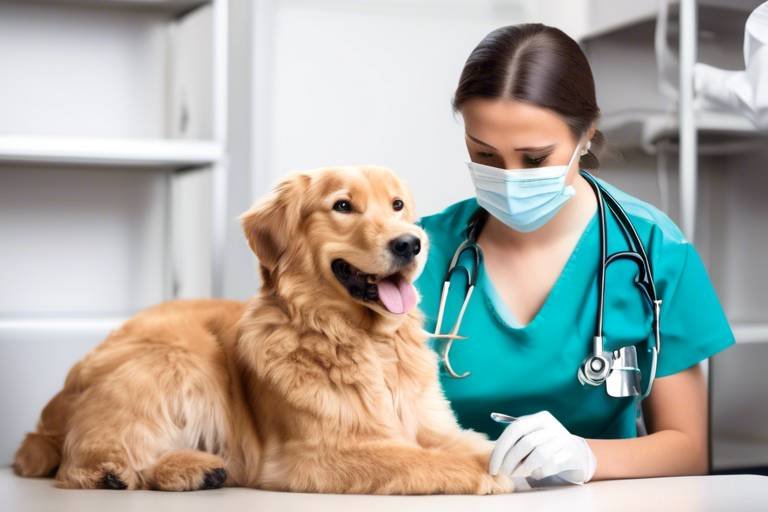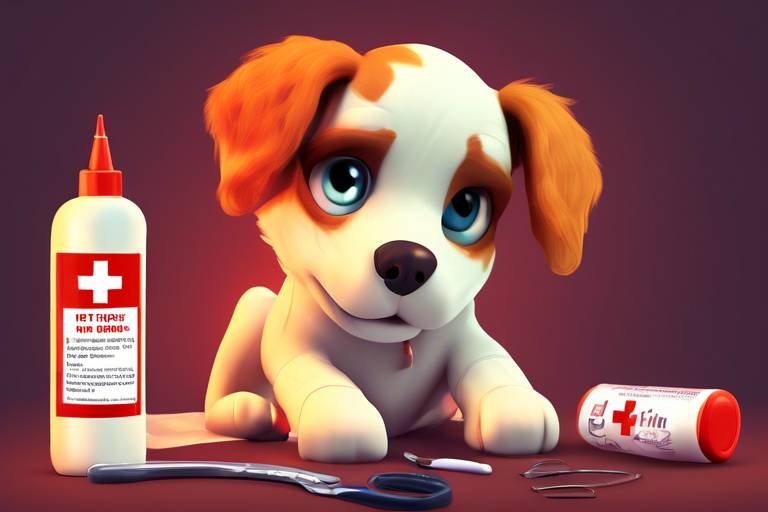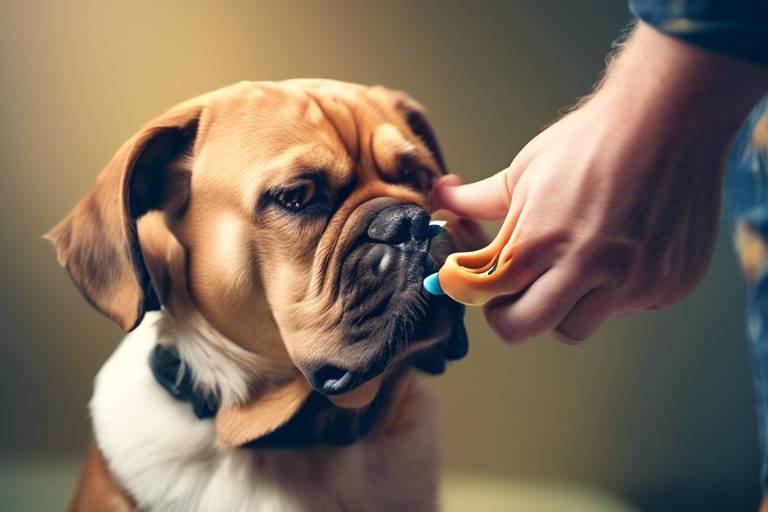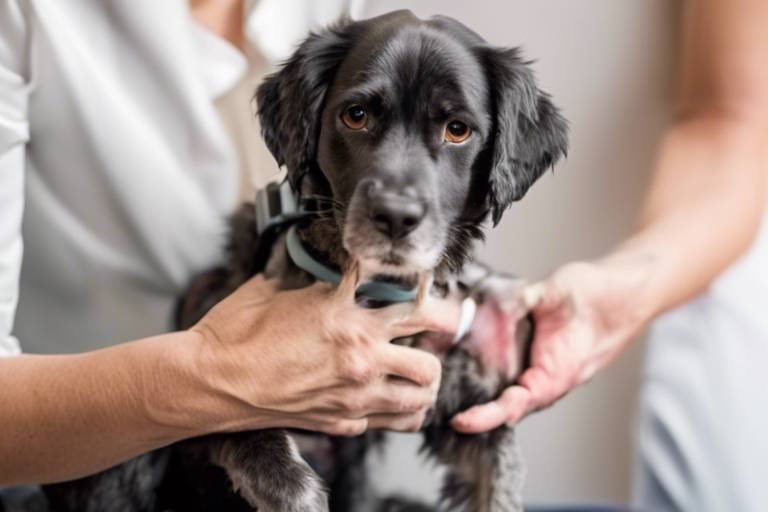The Importance of Regular Vet Visits for Pet Safety
When it comes to our beloved pets, ensuring their health and safety is a top priority for every pet owner. Just like we visit our doctors for regular check-ups, our furry friends also need routine veterinary visits to keep them in tip-top shape. These visits are not just about vaccinations; they play a critical role in preventive care, early detection of diseases, and overall well-being. Imagine your pet as a car; regular maintenance keeps it running smoothly and helps catch potential problems before they become costly repairs. In this article, we will explore the myriad benefits of regular vet visits and why they are essential for the safety and happiness of your pets.
One of the most significant advantages of regular vet visits is the access to essential preventive care. This includes vaccinations, parasite control, and health screenings that protect your pets from various diseases and infections. Just like how we protect ourselves from the flu with vaccines, our pets also need protection against serious illnesses. For instance, vaccinations can prevent deadly diseases like rabies and parvovirus, while parasite control helps keep ticks and fleas at bay. By ensuring that your pets receive these preventive measures, you can significantly enhance their quality of life and longevity. Think of it as a shield that guards your furry companions from the harsh realities of the outside world.
Routine check-ups are crucial for the early detection of health issues. Many diseases can develop silently, without any noticeable symptoms until they reach a critical stage. This is where your veterinarian comes into play. During a routine visit, they can perform comprehensive examinations and diagnostic tests that might reveal underlying health problems. For example, conditions like diabetes, kidney disease, or even cancer can be detected much earlier than if you were waiting for symptoms to appear. Early intervention can lead to more effective treatment options and a better prognosis. It's like catching a leak in your roof before it turns into a waterfall inside your home!
Understanding common health problems that pets face is vital for every pet owner. Regular vet visits help monitor conditions like:
- Obesity: This is a growing concern among pets, leading to various health problems.
- Dental Disease: Often preventable, this issue can cause significant discomfort and health risks.
- Skin Allergies: Many pets suffer from allergies that can lead to itching and infections.
By being aware of these issues, pet owners can recognize symptoms early and take action, making regular vet visits crucial for their pets' health.
Veterinarians are equipped to provide guidance on diet and exercise, helping to manage obesity, which is increasingly common among pets. Regular visits allow for weight monitoring and tailored health plans that promote a healthy lifestyle. Think of your vet as a personal trainer for your pet, offering specialized advice to keep them fit and active.
Dental disease is a common yet preventable issue in pets. Regular vet visits include dental check-ups, ensuring that owners are informed about proper dental hygiene practices. Just like humans, pets need their teeth checked and cleaned to prevent plaque buildup and other dental issues. Regular dental care can save your pet from pain and costly treatments down the line.
Vaccinations are critical for preventing infectious diseases. Regular vet visits ensure pets receive their vaccinations on schedule, protecting them from illnesses that can be life-threatening. Moreover, staying compliant with local laws regarding vaccinations is essential for responsible pet ownership. It's your pet's ticket to a safe and healthy life!
Veterinarians can assess behavioral issues during check-ups, providing insights into potential problems and recommending solutions. Just like how we might seek therapy for our mental health, pets also benefit from behavioral assessments. Early intervention can prevent minor behavioral issues from escalating into significant challenges for pet owners.
Socialization is vital for a pet's development. Vets can offer advice on effectively socializing pets, helping owners understand how to expose their pets to different environments and experiences safely. This guidance fosters well-adjusted pets that thrive in various situations.
Proper training is essential for a well-behaved pet. Regular vet visits can provide owners with training recommendations that address specific behavioral concerns, enhancing the bond between pets and their owners. Think of your vet as a coach, guiding you on the best practices to train your furry friend.
Regular veterinary visits serve as an opportunity for pet owners to learn about their pet's specific needs, including nutrition, exercise, and preventive care. This fosters a better understanding of how to keep pets healthy and happy. Knowledge is power, and the more you know about your pet, the better care you can provide.
Veterinarians can offer tailored nutrition advice based on a pet's age, breed, and health status. This ensures that pet owners are equipped with the knowledge needed to provide a balanced diet that supports overall health. Just as we all have different dietary needs, so do our pets!
Regular vet visits allow for discussions about appropriate exercise routines for pets. Understanding their energy levels and physical needs is crucial for promoting a healthy lifestyle and preventing obesity. Think of exercise as a fun game that keeps your pet's body and mind engaged!
Q: How often should I take my pet to the vet?
A: It's generally recommended to take your pet for a check-up at least once a year, but younger pets or those with health issues may require more frequent visits.
Q: What should I expect during a routine vet visit?
A: During a routine visit, the vet will conduct a physical examination, discuss your pet's health history, and may recommend vaccinations or other preventive care.
Q: Are regular vet visits expensive?
A: While there may be costs associated with vet visits, the long-term savings from preventing health issues often outweigh the expenses. Regular check-ups can save you money on treatments for serious conditions.

Preventive Care Benefits
When it comes to our beloved pets, we all want to ensure they live a long, healthy, and happy life. One of the most effective ways to achieve this is through regular veterinary visits. These check-ups are not just about getting vaccinations; they play a critical role in providing essential preventive care. Think of it as a routine health check for your furry friend, much like how we humans visit the doctor for annual physicals. During these visits, veterinarians can administer vaccinations and conduct thorough examinations to catch any potential health issues before they spiral out of control.
One of the primary benefits of preventive care is the protection against diseases. Vaccinations are crucial in safeguarding pets from various infectious diseases that could be life-threatening. For instance, diseases like rabies, parvovirus, and distemper can be devastating, but they are largely preventable through timely vaccinations. Additionally, preventive care includes parasite control, which protects pets from fleas, ticks, and worms that can cause serious health problems. A regular schedule of preventive treatments can significantly reduce the likelihood of your pet falling ill.
Moreover, these check-ups offer a fantastic opportunity for early detection of potential health issues. Just as we might notice a subtle change in our own health, pets can exhibit signs that something isn't quite right. During a routine visit, veterinarians are trained to spot these signs and diagnose conditions that might otherwise go unnoticed. This early intervention can be a game-changer, allowing for timely treatment that can improve the prognosis for various health conditions.
To illustrate the importance of preventive care, consider the following table that outlines some common preventive measures and their benefits:
| Preventive Measure | Benefit |
|---|---|
| Vaccinations | Protects against infectious diseases |
| Parasite Control | Prevents infestations and associated health issues |
| Dental Check-ups | Maintains oral health and prevents dental disease |
| Weight Monitoring | Helps manage obesity and related health risks |
In addition to these measures, regular vet visits also provide an excellent platform for pet owners to ask questions and learn more about their pet's specific needs. This education is invaluable in understanding how to maintain a healthy lifestyle for your pet. It empowers owners to make informed decisions regarding nutrition, exercise, and preventive care, ultimately fostering a happier and healthier pet.
In conclusion, the benefits of preventive care through regular veterinary visits cannot be overstated. From vaccinations to early disease detection, these check-ups are essential in ensuring that our furry companions lead long, fulfilling lives. So, the next time you think about skipping that vet appointment, remember that it’s not just another chore; it’s a crucial step in safeguarding your pet's health.

Early Disease Detection
When it comes to our beloved pets, early detection of health issues can be the difference between a quick recovery and a long, drawn-out battle with illness. Just like humans, pets can experience a variety of health problems that may not be immediately visible. That's where the importance of regular veterinary check-ups comes into play. These routine visits allow veterinarians to conduct thorough examinations, monitor vital signs, and assess your pet's overall health. Think of it as a wellness check-up for your furry family member, ensuring they are living their best life!
During these visits, veterinarians can identify subtle signs of illness that pet owners might overlook. For instance, a slight change in behavior, such as decreased appetite or lethargy, can be early indicators of underlying health issues. By catching these symptoms early, vets can recommend appropriate tests and treatments, significantly improving the prognosis. Just like a smoke detector alerts you to a fire before it becomes uncontrollable, regular vet visits can help catch health issues before they escalate.
Some common health issues that can be detected during these visits include:
- Obesity: Excess weight can lead to numerous health problems, including diabetes and heart disease. Regular check-ups allow for weight assessments and tailored advice on diet and exercise.
- Dental Disease: Many pets suffer from dental issues that can go unnoticed. Routine dental check-ups help in preventing serious conditions that can affect your pet's overall health.
- Skin Allergies: Pets can develop allergies just like humans. Early detection can lead to effective treatment, providing relief for your pet.
In addition to identifying these common issues, veterinarians can recommend preventive measures to keep your pet healthy. For example, they might suggest regular screenings based on your pet's age, breed, and lifestyle. This proactive approach can help catch conditions such as kidney disease or heart problems before they become critical. The goal is not just to treat illnesses but to prevent them from occurring in the first place.
Moreover, keeping a detailed health history of your pet can aid in early detection as well. This includes noting any changes in behavior, eating habits, or physical appearance. Sharing this information with your veterinarian during check-ups can provide valuable insights into your pet's health and facilitate better diagnosis and treatment plans.
Ultimately, regular vet visits are an investment in your pet's long-term health. Just as you wouldn’t skip your own doctor’s appointments, your pet deserves the same level of care and attention. So, don’t wait for symptoms to appear; make those routine vet visits a priority and ensure your furry friend is on the path to a healthy, happy life!
Q1: How often should I take my pet to the vet?
A: Generally, annual check-ups are recommended for healthy adult pets, while puppies and kittens may need to visit the vet more frequently for vaccinations and growth monitoring. Senior pets may also require more frequent visits.
Q2: What should I expect during a routine vet visit?
A: A typical visit includes a physical examination, discussion of any health concerns, vaccinations, and possibly diagnostic tests if needed. It's also a great opportunity to ask questions about your pet's diet and behavior.
Q3: Can I prevent my pet from getting sick?
A: While you can't prevent all illnesses, regular vet visits, vaccinations, proper nutrition, and exercise can significantly reduce the risk of many health issues.
Common Health Issues
When it comes to our beloved pets, being aware of is essential for every pet owner. Just like humans, pets can face a variety of health challenges that, if left unchecked, can lead to serious complications. Regular vet visits play a crucial role in monitoring these health problems and ensuring your furry friend remains happy and healthy. Some of the most prevalent health issues include obesity, dental disease, and skin allergies. Understanding these conditions can empower you to recognize symptoms early and seek appropriate care.
One of the most alarming trends in pet health is obesity. A significant number of pets are overweight, which can lead to a myriad of health problems, including diabetes, joint issues, and heart disease. During regular check-ups, veterinarians can assess your pet's weight and provide tailored advice on diet and exercise. This proactive approach helps in crafting a personalized health plan that promotes a healthy lifestyle. It's like having a fitness coach for your pet!
Dental disease is another critical area that often goes unnoticed. Many pet owners are unaware that their furry companions can suffer from dental issues just like humans. Regular dental check-ups during vet visits can help identify plaque buildup and gum disease early on. Your veterinarian will also educate you on proper dental hygiene practices, ensuring your pet's teeth stay clean and healthy. Think of it as a dental check-up for your pet, where they can avoid the pain and discomfort associated with dental diseases.
Lastly, let’s talk about skin allergies. Pets can be prone to various allergens, which can result in itchy skin, redness, and discomfort. Regular vet visits are essential for diagnosing and managing these allergies effectively. Your veterinarian can perform tests to determine the cause of the allergies and recommend treatments or lifestyle changes to alleviate your pet's discomfort. It’s like having a personal dermatologist for your pet, ensuring they feel their best!
In summary, being proactive about your pet's health through regular veterinary visits can significantly reduce the risk of these common health issues. By keeping an eye on their weight, dental health, and potential allergies, you can ensure that your furry friend lives a long, healthy, and happy life. Remember, a little prevention goes a long way!
- How often should I take my pet to the vet? It's generally recommended to schedule vet visits at least once a year for healthy pets, but more frequent visits may be necessary for older pets or those with health issues.
- What vaccinations does my pet need? Vaccination needs can vary based on your pet's age, lifestyle, and local regulations. Your veterinarian will provide a tailored vaccination schedule for your pet.
- How can I tell if my pet is overweight? A simple way to check is by feeling your pet's ribs; you should be able to feel them without excess fat covering. Your vet can also provide a body condition score for more accuracy.
- What signs indicate my pet has dental disease? Bad breath, difficulty eating, and swollen gums are common signs. Regular dental check-ups can help catch these issues early.
Obesity Management
Obesity in pets is more than just a cosmetic issue; it is a significant health concern that can lead to a myriad of complications, including diabetes, joint problems, and heart disease. Just like humans, our furry friends can struggle with weight management, often due to a combination of poor diet and lack of exercise. That's where your veterinarian steps in! Regular vet visits are crucial for monitoring your pet's weight and overall health. During these visits, veterinarians can provide tailored advice on diet and exercise, ensuring that your pet maintains a healthy weight and lifestyle.
One of the first steps in managing obesity is understanding your pet's ideal weight, which can vary significantly between breeds. Your vet can help you determine this by conducting a thorough examination and possibly using a body condition score chart. This chart helps assess whether your pet is underweight, at a healthy weight, or overweight. Here’s a simple breakdown of what these scores generally look like:
| Body Condition Score | Description |
|---|---|
| 1-3 | Underweight: Ribs and bones are easily visible. |
| 4-5 | Ideal Weight: Ribs are palpable without excess fat. |
| 6-9 | Overweight: Ribs are difficult to feel under fat. |
Once your vet has assessed your pet's weight, they can help create a customized weight management plan. This plan often includes:
- Dietary Changes: Switching to a high-quality, low-calorie diet can make a significant difference. Your vet might recommend specific brands or types of food that are lower in calories but still nutritious.
- Exercise Routines: Regular physical activity is essential. Your vet can suggest suitable exercises based on your pet's age, breed, and current health status. For instance, older pets might benefit from gentle walks, while younger pets may require more vigorous playtime.
- Regular Monitoring: Scheduling follow-up visits to monitor weight loss progress and adjust the plan as needed is crucial. This accountability can motivate both you and your pet.
In addition to these strategies, it's important to remember that pets are creatures of habit. Establishing a consistent feeding routine and sticking to it can help prevent overeating. Also, be cautious with treats; while it's tempting to spoil your pet, treats should only account for a small portion of their daily caloric intake. Your vet can guide you on healthy treat options that won't derail your pet's weight management efforts.
Ultimately, managing your pet’s weight is a collaborative effort between you and your veterinarian. By prioritizing regular vet visits, you’re not just keeping tabs on your pet’s weight; you’re investing in their long-term health and happiness. So, let’s keep those tails wagging and those bodies healthy!
Q: How often should I take my pet to the vet for weight management?
A: It's recommended to schedule visits every 6-12 months, depending on your pet's health status and weight management needs.
Q: Can I use human food as treats for my pet?
A: While some human foods are safe for pets, many are not. Always consult your vet before introducing new foods into your pet's diet.
Q: What are some signs that my pet might be overweight?
A: Common signs include difficulty in feeling their ribs, lethargy, and difficulty in performing normal activities such as jumping or playing.
Dental Health Care
Dental health is often overlooked in pets, yet it plays a crucial role in their overall well-being. Just like humans, pets can suffer from dental disease, which can lead to serious health complications if left untreated. Regular veterinary visits are essential not only for routine check-ups but also for maintaining your pet's oral hygiene. During these visits, veterinarians can perform thorough dental examinations and cleanings, ensuring that any signs of tartar buildup or gum disease are addressed promptly.
Many pet owners may not realize that poor dental health can affect more than just the mouth. Bacteria from dental disease can enter the bloodstream and impact the heart, kidneys, and liver, leading to systemic health issues. This is why preventive care is so vital. Vets can educate owners on proper dental hygiene practices, including:
- Brushing your pet's teeth regularly
- Providing dental treats and toys designed to promote oral health
- Scheduling professional dental cleanings as recommended
In addition to these practices, understanding the signs of dental problems is key. Common indicators include bad breath, difficulty eating, and swollen or bleeding gums. If you notice any of these symptoms, it's essential to consult your veterinarian immediately. They can provide tailored advice and treatment options to keep your pet's smile healthy and bright.
Moreover, many veterinary clinics offer dental health products that can help maintain your pet's oral hygiene at home. From special toothpastes to mouth rinses, these products can be a great addition to your pet care routine. Remember, investing in your pet's dental health not only prevents painful conditions but also promotes a longer, happier life.
1. How often should I take my pet to the vet for dental check-ups?
Most veterinarians recommend annual dental check-ups, but pets with existing dental issues may require more frequent visits.
2. Can I brush my pet's teeth at home?
Absolutely! Regular brushing is one of the best ways to prevent dental disease. Use toothpaste specifically formulated for pets.
3. What are the signs of dental disease in pets?
Watch for symptoms like bad breath, difficulty eating, swollen gums, and excessive drooling. If you notice any of these signs, consult your vet.
4. Are dental treats effective for maintaining my pet's oral health?
Yes, dental treats can help reduce plaque and tartar buildup. Look for products approved by the Veterinary Oral Health Council (VOHC).
Vaccination Schedules
Vaccinations are a critical aspect of keeping our furry friends safe and healthy. Just like how we humans get our annual flu shots to protect ourselves from the latest viruses, our pets also require a series of vaccinations to shield them from various infectious diseases. These vaccines act as a protective barrier, ensuring that our pets can lead long and happy lives without the risk of falling prey to preventable illnesses. But what does a vaccination schedule look like, and why is it so important? Let's dive into the details!
When you first bring home a puppy or kitten, it’s essential to start their vaccination journey early. Typically, puppies receive their first vaccinations at around six to eight weeks of age, while kittens usually start around the same time. The initial series of vaccinations often includes core vaccines, which are essential for all pets, such as rabies, parvovirus, and distemper. These vaccinations are not just a one-time deal; they require boosters at specific intervals to ensure lasting immunity.
Here’s a general overview of a typical vaccination schedule for dogs and cats:
| Age (Weeks) | Dog Vaccinations | Cat Vaccinations |
|---|---|---|
| 6-8 | DHPP (Distemper, Hepatitis, Parvovirus, Parainfluenza) | FVRCP (Feline Viral Rhinotracheitis, Calicivirus, Panleukopenia) |
| 10-12 | DHPP Booster | FVRCP Booster |
| 14-16 | Rabies | Rabies |
| 1 Year | DHPP Booster | FVRCP Booster |
| Every 1-3 Years | Rabies and DHPP Boosters | FVRCP and Rabies Boosters |
This table provides a basic framework, but it’s crucial to consult your veterinarian for a personalized vaccination schedule tailored to your pet's specific needs. Factors such as your pet's age, health status, lifestyle, and local regulations can influence the timing and type of vaccinations required.
Additionally, keeping track of your pet's vaccination records is essential. This not only helps you stay organized but also ensures that your pet is compliant with local laws, especially if you plan to travel or board them. Some facilities may require proof of vaccinations, so having these records handy can save you a lot of hassle down the line.
In conclusion, adhering to a vaccination schedule is one of the simplest yet most effective ways to safeguard your pet’s health. Regular vet visits will help ensure that your furry companion stays protected against potentially life-threatening diseases, allowing you both to enjoy many years of companionship. Remember, prevention is always better than cure, and when it comes to our beloved pets, it’s our responsibility to keep them safe and sound!
- How often should my pet be vaccinated?
Most pets require vaccinations every 1 to 3 years, depending on the vaccine and local regulations. Always consult your veterinarian for specific recommendations. - Are there side effects to vaccinations?
While most pets tolerate vaccinations well, some may experience mild side effects like lethargy or a slight fever. Serious reactions are rare but can occur, so it’s essential to monitor your pet after their shots. - Can my pet skip vaccinations?
Skipping vaccinations can put your pet at risk for serious diseases. It’s best to follow the recommended vaccination schedule to ensure their health and safety.

Behavioral Assessments
This article discusses the critical role of routine veterinary check-ups in ensuring the health and safety of pets, highlighting preventive care, early detection of diseases, and overall well-being.
Regular vet visits provide essential preventive care, including vaccinations and parasite control, which protect pets from various diseases and infections, ensuring a healthier and longer life for your furry companions.
Routine check-ups enable veterinarians to detect health issues early, allowing for timely intervention and treatment, which can significantly improve the prognosis for conditions that may otherwise go unnoticed until they become severe.
Understanding common health problems that pets face helps owners recognize symptoms early, making regular vet visits crucial for monitoring conditions like obesity, dental disease, and skin allergies, which are prevalent in many animals.
Veterinarians can provide guidance on diet and exercise, helping to manage obesity, which is a growing concern among pets. Regular visits allow for weight monitoring and tailored health plans to promote a healthy lifestyle.
Dental disease is a common yet preventable issue in pets. Regular vet visits include dental check-ups, ensuring that owners are informed about proper dental hygiene practices to maintain their pet's oral health.
Vaccinations are critical for preventing infectious diseases. Regular vet visits ensure pets receive their vaccinations on schedule, protecting them from illnesses that can be life-threatening and ensuring compliance with local laws.
Behavioral assessments during veterinary visits can be a game changer for both pets and their owners. Just like people, pets can exhibit a range of behaviors that may signal underlying issues or simply reflect their personality. By regularly checking in with a veterinarian, you can gain valuable insights into your pet's behavior. For instance, if your dog is suddenly more aggressive or your cat is hiding more than usual, these could be signs of stress, illness, or discomfort. A vet can help determine the root cause and suggest appropriate interventions.
Moreover, behavioral assessments can also identify potential problems before they escalate. Early intervention can prevent minor behavioral issues from turning into significant challenges. For example, a puppy that shows signs of separation anxiety might benefit from training and gradual desensitization, while a cat that is overly territorial may require strategies to ease its stress.
During these assessments, veterinarians can provide tailored advice that includes:
- Socialization Tips: It's essential for pets to be well-socialized. Vets can guide owners on how to introduce their pets to new environments and experiences safely, which is crucial for their development.
- Training Recommendations: Regular vet visits can shed light on specific behavioral concerns, allowing vets to recommend training techniques that enhance the bond between pets and their owners.
In summary, behavioral assessments at the vet are not just about fixing problems; they are about fostering a better relationship between you and your pet. By understanding your pet's unique needs, you can create a happier, healthier environment for them to thrive.
Regular veterinary visits serve as an opportunity for pet owners to learn about their pet's specific needs, including nutrition, exercise, and preventive care, fostering a better understanding of how to keep pets healthy and happy.
Veterinarians can offer tailored nutrition advice based on a pet's age, breed, and health status, ensuring that pet owners are equipped with the knowledge needed to provide a balanced diet that supports overall health.
Regular vet visits also allow for discussions about appropriate exercise routines for pets, helping owners understand their pet's energy levels and physical needs to promote a healthy lifestyle and prevent obesity.
Q: How often should I take my pet to the vet?
A: Generally, it's recommended to take your pet for a check-up at least once a year. However, older pets or those with health issues may require more frequent visits.
Q: What should I expect during a routine vet visit?
A: A routine vet visit typically includes a physical examination, vaccinations, dental check-up, and discussions about your pet's diet and behavior.
Q: Can I ask my vet about behavioral concerns during check-ups?
A: Absolutely! Your vet is there to help you with all aspects of your pet's health, including behavioral issues. Don't hesitate to bring up any concerns you may have.
Socialization Tips
Socialization is a crucial aspect of your pet's development, and it can make a world of difference in their behavior and overall happiness. Just like humans, pets thrive when they are exposed to various environments, people, and other animals. Think of socialization as giving your furry friend a passport to the world; the more experiences they have, the more well-rounded and confident they become. So, how can you effectively socialize your pet? Here are some tips to consider:
First and foremost, start early. If you have a puppy or kitten, the critical socialization window is between 3 and 14 weeks of age. During this time, they are particularly receptive to new experiences. Take them on walks in different neighborhoods, introduce them to various people, and let them interact with other animals. This early exposure can help shape their behavior for years to come.
For older pets, don’t worry! It’s never too late to start socializing. Begin by taking them to pet-friendly parks or local events where they can meet other pets and people. Remember, the goal is to create positive associations with new experiences. You might consider using treats or praise to reward your pet for calm behavior during these interactions. This positive reinforcement can help reduce anxiety and encourage good behavior.
Additionally, consider enrolling your pet in a training class or socialization group. These settings provide a controlled environment where pets can learn to interact with others under the guidance of a professional. Plus, it’s a fantastic opportunity for you to meet other pet owners and share experiences. Many times, these classes also cover basic obedience training, which is an added bonus!
Don’t forget about the importance of gradual exposure. If your pet seems overwhelmed in a new situation, take a step back. Allow them to observe from a distance before gradually introducing them to closer interactions. This can help them feel more secure and less anxious. For instance, if you're at a dog park, let them watch other dogs play before joining in. Patience is key!
Lastly, always be mindful of your pet's body language. Signs of stress or discomfort can include panting, barking, or trying to hide. If you notice these signs, it’s essential to remove them from the situation and try again later. Socialization should always be a positive experience, and respecting your pet's limits will help build their confidence over time.
In summary, socialization is not just about getting your pet used to new experiences; it's about enriching their lives and promoting their well-being. By starting early, providing positive experiences, and being mindful of their comfort levels, you can help your pet become a well-adjusted and happy member of your family.
- How often should I take my pet for socialization? - It's best to incorporate socialization into your pet's routine regularly. Aim for short, positive experiences a few times a week.
- What if my pet is fearful of new experiences? - Start slowly and give your pet time to adjust. Use treats and praise to encourage them, and don’t rush the process.
- Can socialization help with behavioral issues? - Yes! Proper socialization can reduce anxiety and aggression, leading to a more balanced and well-behaved pet.
- Is it safe to socialize my pet during a pandemic? - Always follow local guidelines and consider virtual training classes if in-person interactions are limited.
Training Recommendations
When it comes to training our beloved pets, regular veterinary visits can be a goldmine of information. Vets are not just there to check your pet's health; they can also provide invaluable insights on training techniques tailored to your furry friend’s specific needs. Think of your vet as a coach who knows the playbook for keeping your pet well-behaved and happy. After all, a well-trained pet is not just a joy to have around; it also enhances the bond between you and your companion.
During routine check-ups, take the opportunity to discuss any behavioral concerns you might have. Whether it's excessive barking, chewing on furniture, or not coming when called, your vet can recommend effective training strategies. They might suggest positive reinforcement techniques, which are proven to be effective and humane. This approach involves rewarding your pet for good behavior, which encourages them to repeat those actions. It’s a little like getting a gold star in school; who doesn’t love a bit of praise?
Moreover, your vet can guide you on the best training tools to use. For instance, they may recommend specific types of collars, leashes, or even training aids that can make the process smoother. A well-informed owner is a successful trainer, and having the right tools can make all the difference. Just like a chef needs the right utensils to whip up a delicious meal, you need the right gear to train your pet effectively.
Another vital aspect of training that vets can help with is socialization. Many behavioral issues stem from a lack of exposure to different environments and situations. Your vet can provide advice on how to safely introduce your pet to new experiences, whether it's meeting other dogs at the park or adjusting to the hustle and bustle of a busy street. They might even suggest puppy classes or socialization events that are beneficial for younger pets. Remember, the more experiences your pet has, the more well-rounded they’ll become.
In addition, regular visits allow for ongoing assessments of your pet’s progress. Training isn’t a one-and-done deal; it requires consistency and adaptation. Your vet can help you track your pet’s development and adjust training methods as needed. Think of it as a check-in with your trainer to see how far you've come and what areas need a bit more work. This ongoing support can be crucial, especially if you're facing challenges along the way.
In summary, don’t overlook the importance of discussing training during your vet visits. The knowledge and resources they provide can empower you to train your pet effectively, ensuring a harmonious relationship. After all, a little guidance can go a long way in transforming a mischievous pup into a well-mannered companion.
- How often should I take my pet to the vet for training advice? It's recommended to discuss training at least during annual check-ups, but more frequent visits can be beneficial if you're working on specific issues.
- Can my vet help with behavioral issues? Absolutely! Vets are trained to recognize and address various behavioral problems and can provide tailored advice.
- What training methods do vets recommend? Most vets endorse positive reinforcement techniques, which are effective and promote a loving bond between you and your pet.
- Is socialization important for my pet? Yes! Socialization is crucial for preventing behavioral issues and helping your pet adapt to different environments.

Owner Education
Regular veterinary visits serve as an invaluable opportunity for pet owners to gain a deeper understanding of their furry friends' specific needs. It's not just about taking your pet in for shots or check-ups; it's about fostering a comprehensive knowledge base that empowers you to make informed decisions for their health and happiness. During these visits, veterinarians can provide essential insights into various aspects of pet care, including nutrition, exercise, and preventive care.
For instance, when it comes to nutrition, your vet can offer tailored advice based on your pet's age, breed, and health status. This personalized guidance is crucial because different pets have varying dietary requirements. A young, active puppy will have different nutritional needs compared to a senior dog with health issues. Understanding these differences helps owners provide a balanced diet that supports overall health and vitality.
Moreover, regular vet visits create a platform for discussing exercise routines that are appropriate for your pet. Just like humans, pets need to stay active to maintain a healthy weight and prevent obesity-related issues. Your veterinarian can assess your pet's energy levels and suggest activities that suit their age and breed. Whether it's a brisk walk, playtime in the yard, or interactive games, the right exercise routine can significantly enhance your pet's quality of life.
Additionally, these visits are an excellent time to discuss preventive care practices that can help avert health problems down the line. This includes everything from the importance of vaccinations to the necessity of regular parasite control. By staying informed about these preventive measures, pet owners can take proactive steps to protect their pets from potential health threats.
In essence, regular veterinary visits are not just a routine chore; they are a vital part of responsible pet ownership. They provide a platform for education, ensuring that you are well-equipped to cater to your pet's needs. By actively engaging with your veterinarian and asking questions, you can foster a healthier, happier life for your beloved companion. So, the next time you schedule that vet appointment, remember: it's not just a visit; it's an investment in your pet's future!
- How often should I take my pet to the vet? - It is generally recommended to visit the vet at least once a year for a check-up, but older pets or those with health issues may require more frequent visits.
- What should I expect during a routine vet visit? - A typical visit may include a physical examination, vaccinations, discussions about diet and exercise, and any necessary tests.
- Can I ask my vet questions during the appointment? - Absolutely! Your vet is there to help you understand your pet's health and care needs, so don't hesitate to ask questions.
Nutrition Guidance
This article discusses the critical role of routine veterinary check-ups in ensuring the health and safety of pets, highlighting preventive care, early detection of diseases, and overall well-being.
Regular vet visits provide essential preventive care, including vaccinations and parasite control, which protect pets from various diseases and infections, ensuring a healthier and longer life for your furry companions.
Routine check-ups enable veterinarians to detect health issues early, allowing for timely intervention and treatment, which can significantly improve the prognosis for conditions that may otherwise go unnoticed until they become severe.
Understanding common health problems that pets face helps owners recognize symptoms early, making regular vet visits crucial for monitoring conditions like obesity, dental disease, and skin allergies, which are prevalent in many animals.
Veterinarians can provide guidance on diet and exercise, helping to manage obesity, which is a growing concern among pets. Regular visits allow for weight monitoring and tailored health plans to promote a healthy lifestyle.
Dental disease is a common yet preventable issue in pets. Regular vet visits include dental check-ups, ensuring that owners are informed about proper dental hygiene practices to maintain their pet's oral health.
Vaccinations are critical for preventing infectious diseases. Regular vet visits ensure pets receive their vaccinations on schedule, protecting them from illnesses that can be life-threatening and ensuring compliance with local laws.
Veterinarians can assess behavioral issues during check-ups, providing insights into potential problems and recommending solutions. Early intervention can prevent minor behavioral issues from escalating into significant challenges for pet owners.
Socialization is vital for a pet's development. Vets can offer advice on socializing pets effectively, helping owners understand how to expose their pets to different environments and experiences safely.
Proper training is essential for a well-behaved pet. Regular vet visits can provide owners with training recommendations that address specific behavioral concerns, enhancing the bond between pets and their owners.
Regular veterinary visits serve as an opportunity for pet owners to learn about their pet's specific needs, including nutrition, exercise, and preventive care, fostering a better understanding of how to keep pets healthy and happy.
Nutrition is the cornerstone of your pet’s health, and regular vet visits are a prime opportunity to dive deep into dietary needs. Just like humans, pets require a balanced diet tailored to their age, breed, and health status. Imagine your pet's body as a finely-tuned machine; the right fuel can keep it running smoothly, while poor nutrition can lead to a breakdown. During these visits, veterinarians can offer personalized nutrition advice, ensuring that you’re equipped with the knowledge needed to provide a balanced diet that supports overall health.
For instance, younger pets may need diets rich in protein to support their growth, while older pets might require lower-calorie options to prevent obesity. Here’s a quick overview of what to consider:
| Life Stage | Dietary Needs |
|---|---|
| Puppies/Kittens | High protein, fat, and calorie content for growth |
| Adult Pets | Balanced diet with appropriate calories for maintenance |
| Senior Pets | Lower calories, joint support, and easy-to-digest ingredients |
Furthermore, your veterinarian can help you identify any food allergies or sensitivities your pet may have. This information is crucial because it can prevent discomfort and serious health issues down the line. Have you ever noticed your pet scratching excessively or having digestive issues? These could be signs of food allergies that a vet can help diagnose.
So, don’t hesitate to ask your vet about the best food options for your furry friend during your next visit. After all, a well-nourished pet is a happy pet!
- How often should I take my pet to the vet? It’s generally recommended to visit the vet at least once a year, but younger pets or those with health issues may need more frequent visits.
- What vaccinations does my pet need? Vaccination needs can vary based on your pet's age, health, and lifestyle. Your vet will provide a tailored vaccination schedule.
- How can I tell if my pet is overweight? A vet can assess your pet's weight and body condition. You can also check for a visible waist and feel their ribs without excess fat covering.
- What should I do if my pet has a behavioral issue? Discuss any concerns with your vet during check-ups; they can provide guidance or recommend a professional trainer.
Exercise Recommendations
This article discusses the critical role of routine veterinary check-ups in ensuring the health and safety of pets, highlighting preventive care, early detection of diseases, and overall well-being.
Regular vet visits provide essential preventive care, including vaccinations and parasite control, which protect pets from various diseases and infections, ensuring a healthier and longer life for your furry companions.
Routine check-ups enable veterinarians to detect health issues early, allowing for timely intervention and treatment, which can significantly improve the prognosis for conditions that may otherwise go unnoticed until they become severe.
Understanding common health problems that pets face helps owners recognize symptoms early, making regular vet visits crucial for monitoring conditions like obesity, dental disease, and skin allergies, which are prevalent in many animals.
Veterinarians can provide guidance on diet and exercise, helping to manage obesity, which is a growing concern among pets. Regular visits allow for weight monitoring and tailored health plans to promote a healthy lifestyle.
Dental disease is a common yet preventable issue in pets. Regular vet visits include dental check-ups, ensuring that owners are informed about proper dental hygiene practices to maintain their pet's oral health.
Vaccinations are critical for preventing infectious diseases. Regular vet visits ensure pets receive their vaccinations on schedule, protecting them from illnesses that can be life-threatening and ensuring compliance with local laws.
Veterinarians can assess behavioral issues during check-ups, providing insights into potential problems and recommending solutions. Early intervention can prevent minor behavioral issues from escalating into significant challenges for pet owners.
Socialization is vital for a pet's development. Vets can offer advice on socializing pets effectively, helping owners understand how to expose their pets to different environments and experiences safely.
Proper training is essential for a well-behaved pet. Regular vet visits can provide owners with training recommendations that address specific behavioral concerns, enhancing the bond between pets and their owners.
Regular veterinary visits serve as an opportunity for pet owners to learn about their pet's specific needs, including nutrition, exercise, and preventive care, fostering a better understanding of how to keep pets healthy and happy.
Veterinarians can offer tailored nutrition advice based on a pet's age, breed, and health status, ensuring that pet owners are equipped with the knowledge needed to provide a balanced diet that supports overall health.
Exercise is a crucial component of a pet's overall health and well-being. Just like humans, pets need regular physical activity to maintain a healthy weight and avoid various health issues. When you visit the vet, they can help you create an exercise plan that suits your pet's unique needs. This plan should take into account factors such as age, breed, and any existing health conditions. For instance, a young, energetic Labrador may require more vigorous exercise compared to a senior Chihuahua.
Here are some key points to consider regarding your pet's exercise routine:
- Daily Walks: Most dogs benefit from daily walks. This not only helps them burn off energy but also provides mental stimulation through new sights and smells.
- Playtime: Engaging in playtime activities, such as fetch or tug-of-war, can be a fun way to exercise your pet while strengthening your bond.
- Interactive Toys: For indoor pets or those with limited mobility, interactive toys can encourage movement and keep them mentally engaged.
Additionally, the vet may suggest specific activities tailored to your pet’s needs. For example, swimming can be an excellent low-impact exercise for older dogs or those with joint issues. Always remember, a well-exercised pet is a happy pet!
- How often should I take my pet to the vet? It’s generally recommended to visit the vet at least once a year for routine check-ups, but more frequent visits may be necessary for older pets or those with health issues.
- What vaccinations does my pet need? Vaccination needs can vary based on your pet’s age, lifestyle, and local regulations. Your veterinarian can provide a personalized vaccination schedule.
- What signs indicate my pet may need to see a vet? Signs such as changes in appetite, lethargy, vomiting, or unusual behavior should prompt a visit to the vet.
Frequently Asked Questions
- Why are regular vet visits important for my pet?
Regular vet visits are crucial for your pet's health as they provide preventive care, early disease detection, and ongoing education for pet owners. Just like we visit the doctor for check-ups, our furry friends need the same attention to catch potential issues before they become serious.
- What are the benefits of preventive care?
Preventive care includes vaccinations, parasite control, and routine health checks, all of which help protect your pet from various diseases. It's like putting on sunscreen before heading out in the sun; it helps keep your pet safe and healthy!
- How can I recognize if my pet is overweight?
Keep an eye on your pet's body shape and weight. If they have a noticeable belly or their ribs are hard to feel, it's time to consult your vet. Just like humans, pets can struggle with weight, and regular check-ups can help manage it effectively.
- What should I expect during a vet visit?
During a vet visit, the veterinarian will perform a physical examination, discuss your pet's health history, and may recommend vaccinations or tests. Think of it as a health check-up where your pet gets pampered and assessed!
- How often should I take my pet to the vet?
Generally, adult pets should visit the vet at least once a year, while puppies and kittens may need more frequent visits. It's like scheduling a yearly check-up for yourself; consistency is key for maintaining good health.
- Can my vet help with my pet's behavioral issues?
Absolutely! Vets can assess behavioral problems and provide recommendations for training and socialization. They can help you understand your pet's behavior, turning potential challenges into manageable solutions.
- What vaccinations does my pet need?
Your pet's vaccination schedule will depend on their age, health status, and local regulations. Common vaccines include those for rabies, distemper, and parvovirus. Think of vaccinations as a shield that keeps your pet safe from serious illnesses!
- How can I ensure my pet has a balanced diet?
Consult your vet for tailored nutrition advice based on your pet's needs. A balanced diet is like a well-rounded meal for humans; it provides the necessary nutrients to keep your pet healthy and energetic!
- What are the signs that my pet needs to see the vet?
Signs include changes in appetite, lethargy, vomiting, diarrhea, or any unusual behavior. If something feels off with your pet, it's always better to be safe and consult your vet—think of it as your pet's way of saying, "I need help!"



















